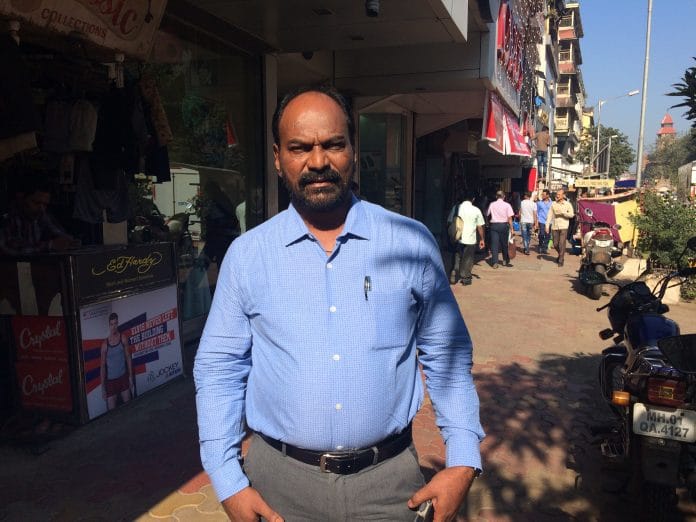Arun Jadhav still regrets he couldn’t lift his wounded hand to shoot Ajmal Kasab and protect top cops Karkare, Kamte and Salaskar.
Mumbai: Head constable Arun Jadhav has only one regret in his nearly 30 years in the Mumbai Police – that he could do nothing to protect his mentor, top cop and encounter specialist Vijay Salaskar.
But it is a regret that comes tinged with a dilemma, or perhaps it is his way of coming to terms with what is also the biggest nightmare of his career.
“I could not lift my injured hand to fire at Kasab,” Jadhav recalls of that horrific night nine years back when India’s commercial capital was attacked by Lashkar-e-Taiba terrorists from Pakistan.
“But, if I could have fired, I would have possibly ended up killing the only surviving militant because of whom we could unravel the entire plot and trace Pakistan’s links,” Jadhav says. “As they say, everything happens for a reason.”
On 26 November 2008, Jadhav, then a constable, was in the police vehicle with Salaskar and top IPS officers Hemant Karkare and Ashok Kamte.
While the three officers were killed by Ajmal Kasab and Abu Ismail in an ambush, Jadhav lay injured in the vehicle under a pile of corpses. Later that night, it was Jadhav’s wireless message that played a crucial role in killing Ismail and nabbing Kasab.
Nine years on, Jadhav, now head constable in the Anti-Extortion Cell, is hard at work, tracing gangsters Ravi Pujari and Suresh Pujari’s men, pursuing clues and seizing weapons.
He still suffers a 42 percent handicap in his right hand, which he cannot fully bend. But that has neither come in the way of his postings, nor in the way of his work, 50-year-old Jadhav said.
“At the time of the attacks, I was with the Anti-Extortion Cell working with Salaskar saheb and even now, I am doing exactly what I was required to do then,” said Jadhav, who describes Salaskar as his mentor and an elder brother who always made Jadhav feel like a part of his family.
“I have completed almost 30 years working with the police and the journey has been very satisfying. I learnt a lot under Salaskar saheb. I don’t have his guidance today, but I am being able to put all that learning to use now.”
“Even after 26/11, I have always had good postings where I could make use of my learning and abilities, except for one short stint. But even there, the government gave me swift justice,” he added.
Jadhav resumed work six months after the 26/11 attacks and was posted at the Mumbai Crime Branch’s Anti-Motor Vehicle Theft Squad. In 2012, the constable was transferred to the local arms division at Naigaon in Central Mumbai – the only stifling transfer in Jadhav’s career.
As part of his work here, Jadhav had to be part of the police bandobast (security) for various events. Within a month of his transfer, Jadhav was standing at the gates of Vidhan Bhavan, the state legislature, as part of the security for the monsoon session.
Nationalist Congress Party’s (NCP) Kiran Pawaskar recognised Jadhav, standing at the gates saluting politicians. Irked with the treatment meted out to a 26/11 hero, he raised a motion in the state legislative council demanding Jadhav be given a posting of his choice.
The then state home minister R.R. Patil promptly consulted Jadhav and transferred him to the Anti-Terrorism Squad under Rakesh Maria.
“When Maria saheb took charge as Mumbai Commissioner of Police in 2014, he requested my transfer back to the Crime Branch where I started working with the Anti-Extortion Cell once again. Since then, I have worked on a number of cases under the Maharashtra Control of Organised Crime Act and those involving weapons seizures,” said Jadhav, who lives with his family in the police quarters in Byculla.
He is especially proud of two recent cases where he played a significant role in detection. One is a February 2016 firing at a restaurant in Mumbai’s western suburb of Vile Parle. The shooter wore a mask, while the rider wore a helmet, making them impossible to recognise.
“I got crucial information that helped in the detection. We caught the accused earlier this year,” Jadhav said. Similarly, the head constable recounts how he and his colleagues foiled a planned attack on a Dombivli corporator in 2015 by nabbing suspects who were also wanted for opening fire at an engineer in 2005.
“It is just that now my family is always worried about my safety every time I step out for work. I have strict instructions of informing them when I get late at work. I can understand the concern,” said Jadhav, his otherwise straight face briefly breaking into a smile.
He now has more reason to smile. Besides the various medals and accolades, his contribution to nabbing Kasab is also helping his eldest daughter, Dhanashree, get a job in the state agriculture department.
The government initially refused her application on the grounds that her father is not a martyr. However, Chief Minister Devendra Fadnavis intervened and a formal letter is likely to be issued soon, Jadhav said.






